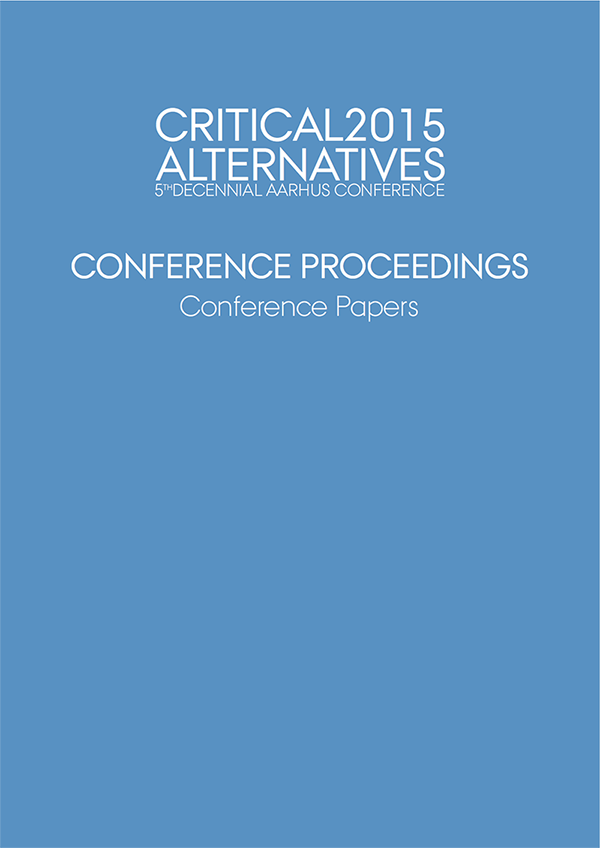Shifting Borderland of Technoscience: Tracing Trajectories of Critical Practice
DOI:
https://doi.org/10.7146/aahcc.v1i1.21471Nøgleord:
Critical technical practice, critical making, critical design, critical computing, social computing, reflective design, located accountability, feminist HCI, research community, sociotechnical studies, interdisciplinarityResumé
Since the publication of Phil Agre’s [1] seminal work on critical technical practice, the sites of intersection between computation and society have multiplied, and so too have the sociotechnical borderlands we inhabit. Critical methodologies such as “critical design” [8,6,5], “reflective design” [3,4,7,9,15,12], “critical making” [11,6,7], “located accountability” [13, 14], “feminist HCI” [2], and “postcolonial computing” [10] have proliferated and are being taken up in increasingly diverse political, cultural and social contexts. As the sites of critical praxis have multiplied, new regimes like big data and social computing pose new challenges. Given the fluidity of the landscape it is important for us to articulate the specificities of our scholarly borderlands. By bringing together junior and senior scholars we aim to provide a forum for researchers in this area to learn from each other how to navigate changing terrains of technology research and design. To maximize in- depth collaboration between junior and senior scholars, we propose a format that includes in-depth mentoring sessions, panel presentations from junior and senior participants, group activities, and working sessions for steps forward. The goal of the proposed workshop is to foster cohesion and build mentoring relationships within the community by creating a space for open and honest dialogue about the challenges of conducting critical research and design practice. Outcomes from this workshop will be a shared knowledge base about praxis, tracing the trajectories, continuities, traversals and inheritances of critical sociotechnical research over the past decade, as well as strengthening of the critical technical practice community by way of establishing lasting mentorship relations.
Referencer
Agre, P., 1997. Toward a Critical Technical Practice: Lessons Learned in Trying to Reform Al. Social science, technical systems, and cooperative work: Beyond the Great Divide, p.131.
Bardzell, S., 2010. Feminist HCI: taking stock and outlining an agenda for design. In Proceedings of the 28th international conference on Human factors in computing systems. pp. 1301–1310.
Bødker, S., 2006. When second wave HCI meets third wave challenges. In Proceedings of the 4th Nordic conference on Human-computer interaction: changing roles. pp. 1–8.
Coleman, G. 2012. Anonymous and I [Guest contributor] post on ethnography matters.
http://ethnographymatters.net, last accessed October, 2012.
DiSalvo, C., Nourbakhsh, I., & Holstius, D. (2008). The neighborhood networks project: A case study of critical engagement and creative expression through participatory design.
Dunne, A. and Raby, R. 2001. Design Noir: The Secret Life of Electronic Objects, Springer.
Leahu, L., Thom-Santelli, J., Pederson, C., Sengers, P. 2004. Taming the Situationist Beast. In Proceedings of the 7th ACM Conference on Designing Interactive Systems (DIS), 203-211.
Light, A. (2011) Democratising Technology: Inspiring Transformation with Design, Performance and Props, In Proc. of the 2011 ACM Conference on Human Factors of Computing.
Lindtner, S., Anderson, K., Dourish, P. 2012. Cultural Appropriation: Information Technologies as Sites of Transnational Imagination. Proc. of the ACM Conference on CSCW, Seattle, Washington.
Philip, K., Irani, L. & Dourish, P., 2012. Postcolonial Computing A Tactical Survey. Science, Technology & Human V alues, 37(1), pp.3–29.
Ratto, M., 2011. Critical Making: conceptual and material studies in technology and social life. The Information Society, 27(4), pp.252–260.
Sengers, P. et al., 2005. Reflective design. In Proceedings of the 4th decennial conference on Critical computing: between sense and sensibility. pp. 49–58.
Suchman, L., 2002. Located accountabilities in technology production. Scandinavian Journal of Information Systems, 14(2), pp.91–106.
Taylor, A. 2011. Out There. In Proc. of the 2011 ACM Conference on Human Factors of Computing, 685-694.
Williams, A., Brewer, J., Gibb, A., Wilhelm, E., Forrest, H. 2012. Indy R&R: Doing HCI Research Off the Beaten Path, Juried Panel at CHI 2012, Austin, TX.




